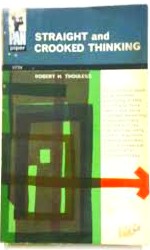Selected Reviews by Subject:- Film, TV, DVDs, CDs, media critics | Health, Medical | Jews (Frauds, Freemasons, Religions, Rules, Wars) | Race | Revisionism | Women | Bertrand Russell | Richard Dawkins | Martin Gardner

I think Thouless mainly copied and rewrote old stuff, although some books after Thouless acknowledge him in glowing terms.
The logical part has 38 fallacies which Thouless identified, or copied—there are almost this same number in Jones's 1905 book, A Primer of Logic, and on page 170 of my paperback he talks about text-books of logic and their lists of 'fallacies', where he claims his list is 'something quite different. Its aim is practical and not theoretical.'
The next parts of Thouless are, first, his philosophy—rather a ragbag, not very deep, a sort of British empiricism, as indeed the arbitrary number of 38 suggests], and second, his psychology—his main concepts are suggestibility and prejudice.
His topics include the press—Kingsley Martin, The Press The Public Wants is mentioned; education; nationalism and national stereotypes; the First World War; Nautical metaphors, taken from A.P. Herbert's What a Word!; Julian Huxley's letter in The Times on their names of rivals in the Spanish Civil War; and Germany as seen by England. Other books he mentions include Prof Charlton, The Art of Literary Study, Bentham, Theory of Fictions, Plato's Republic. Other topics include Aristotle's BARBARA mnemonic, Charles Darwin's note-making habits, Hobbes, and Kropotkin, for their views on human nature, telepathy, the fallacy of the beard, and life after death.
There's a mock conversation at the end of the book, in which three men, a business man, a professor, and a clergyman, discuss socialism and a general election and assorted controversial subjects; Thouless put in as many crooked arguments as he can. Or at least, that's what he claimed—in fact all the arguments are newspaper-based. There are no personal beliefs or anecdotes, which may introduce unofficial views. There are no illustrations of research or burrowing below the surface.
The book is quite convincingly written; it's only on further thought, or on trying to put Thouless into practice, that the limitations start to surface. A book reprinted after forty years of enormous change must be suspected of serious omissions. In my view, the outstanding defect is the failure to identify evidence and its sources, if these indeed exist. Thouless in his later versions says nothing on Nuremburg Trials, or concentration camps, or what happened to the British Empire, or Eisenhower and deaths by the Rhine; just as he said nothing about the 'Great War', within living memory, most of which was shrouded in almost total secrecy. He says nothing on mysterious events in the recent war, and whether anything can be said about them. Thouless says nothing on money, what it is, and what can be done with it. Scientific issues are of course not touched: how many people can discuss electricity supplies, or war deaths, or the real causes of the supposed 'Spanish flu' epidemic of the time, or events in the USSR?
As with almost all books, there's no way to tell how much material might have been censored or cut out.